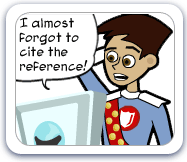Shortcuts:.
Is it Better Than Other Resources?
Bookmark and Share Reliable Sites
Learn more about Using the Web for Research in Maya's blog archives:
Searching for Resources | Evaluating the Information | Using Web Resources
Web resources are slightly different than other resources and you have to consider certain things when using them:
Is It Better Than Other Resources?

It's easy to find information on the Web, but it's not always the best information available on a topic. There is a wide range of media that you can use for research, including books, newspapers and magazines, interviews, films and videos, and audio recordings.
The Web is best for shallow research on a broad range of recent topics like current news and trends, new discoveries, and people's opinions. You can also easily find a variety of multimedia for your topic; websites frequently contain many different types, such as images, text, videos, and interactive applications.
In-depth information on older topics can be much harder to find on the Web. You're probably better off exploring other media.
Avoid Plagiarism

Plagiarism is when you use someone else's ideas or words without acknowledging them or giving them credit. To avoid plagiarism, you must give the author credit whenever you:
- Refer to someone's idea or theory
- Use any facts or statistics that are not common knowledge
- Use images, graphs, or charts created by someone else
- Quote or paraphrase (changing around a few words or changing the order of the original author's sentences) another person's words or work
To correctly cite your source, you must also indicate which part of your work is taken from another's. When your source is a website, it can sometimes be tricky to find the information you need to cite it. Learn more about how to correctly cite a website at the Purdue OWL: MLA Formatting and Style Guide. It's also a good idea to get the permission of the site's owner before using their work.
Bookmark and Share Reliable Sites

When you find a site that is a good resource, add it to your Web browser favorites or bookmarks. You never know when you will need it again, and sites you know to be reliable are a great place to start when researching a new topic.
Why not share your resources with others as well? Not only will they be grateful for the help, but they may just return the favor and save you some research work too.
You can even work with a teacher or librarian to set up a list of good Web resources that everyone can use and contribute to.
This is the list that Maya started for the Academy:
Maya's Favorite Web Resources
Environment
- Kids For Saving Earth
- Ekko World
- Nature Challenge for Kids
- Kids Planet
- The Green Squad
- The Big Blue Bus
- Climate Change Kids Site
- Kids Saving Energy
- Earth Matters for Kids
- Treehugger
Insects & Animals
- National Wildlife Federation
- World Wildlife Fund
- San Diego Zoo
- National Zoo
- National Aquarium in Baltimore
- Monterey Bay Aquarium
- New England Aquarium
- Insectlopedia
- Iowa State Dept. of Entomology
Science & Nature
- Scientific American
- The Nature Conservatory
- National Science Foundation
- NASA
- National Park Service
- US Geological Survey
- National Weather Service's JetStream
Museums & Science Centers
- American Museum of Natural History
- Smithsonian
- British Museum
- Exploratorium
- Franklin Institute
- National Air and Space Museum
- Museum of Modern Art
- Metropolitan Museum of Art
Specialists TV Channels
- Discovery Channel
- Discovery Science Channel
- National Geographic Channel
- History Channel
- PBS NOVA
- National Public Radio
Cooking
- Cool Kids Cooking
- Spatulatta
- Kids Food
- Cooking with Kids
- The Wee Kiwis
- Children’s Recipes
- Kids Food: Healthy recipes for kids
Libraries
Educational
- Exploratorium
- Starfall
- The Kidz Page
- Fun Brain
- Enchanted Learning
- Nick Junior
- Kids Know It
- Zula
- PBS Kids
- Scholastic
- Brainpop
Languages
Homework
Encyclopedias
Dictionaries & Thesauruses
Mechanics
News
- National Public Radio (NPR)
- Public Broadcasting Service (PBS)
- Cable News Network (CNN)
- MSNBC
- Google News
- American Broadcasting Company (ABC)
- Fox News
Searching for Resources | Evaluating the Information | Using Web Resources

